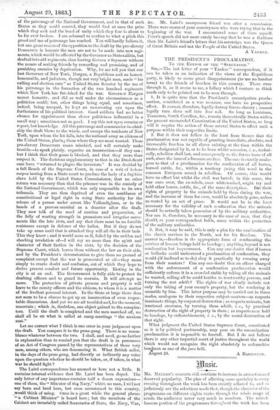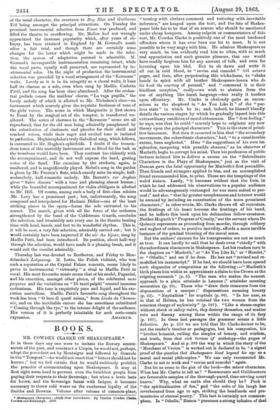Ntusix.
M. MELLON'S concerts still continue to increase in attraction and deserved pepularity. The plan of allotting some speciality to every evening throughout the week has been strictly adhered to, and so judiciously are tlse selections me.de thet, though the character of the programme on different nights varies through the whole range of music, the audiences never vary much in numbers. The miscel- laneous portion of the programmes throughout the week has been of the usual character, the overtures to Buy Bias and Guillaume Tell being amongst the principal attractions. On Tuesday the promised instrumental selection from Faust was produced, and idled the theatre to overflowing. Mr. Mellon had not wrongly appreciated the immense popularity which, after years of ob- loquy, has been attained in England by M. Gounod's music after a fair trial, and though there are certainly some changes for the better which might be made in the selec- tion, the system of adaptation pursued is admirable, M. Gounod's incomparable instrumentation remaining intact, while the vocal parts, equally well preserved, are represented by in- strumental solos. On the night of production the instrumental selection was preceded by a vocal arrangement of the "Kermesse" waltz. Lovely as it is in its integrity as a choral waltz, it loses half its charms as a solo, even when sung by Madlle. Carlotta Patti, and the song has been since abandoned. After the orches- tral prelude comes the maidens' chorus, "La vaga pupilla," the lovely melody of which is allotted to Mr. Nicholson's oboe—an instrument which scarcely gives the requisite freshness of tone of the girls' voices. The scene in which Marguerite is first shown -to Faust by the magical art of the tempter, is transferred un- altered. The series of choruses in the "Kermesse " scene are all reproduced, that for the old men being admirably paraphrased by the substitution of clarionets and piccolos for their shrill and cracked voices, while their eager and excited tone is imitated to perfection. Mephistopheles's truly diabolical song, which follows, is entrusted to Mr. Hughes's ophicleide. I doubt if the tremen- dous tones of this unwieldy instrument are so fitted for the task as the trombone would have been. They contrast too violently with the accompaniment, and do not well express the hard, grating -voice of the fiend. The exorcism by the students, again, is unaltered, and is magnificently played. Siebel's song in the garden is given by Mr. Pratten's flute, which exactly suits its simple, half- melancholy, half-romantic melody. Mr. Barrett's cor Anglais gives "Salve dimora " with a tone and phrasing almost human ; while the beautiful accompaniment for violin obbligato is allotted to Mr*. Hill. Of course, among such a body of first-class soloists Air. Levy has a prominent part ; but, unfortunately, the song composed and interpolated for Madame Didier—one of the least striking pieces in the opera—forms the solo entrusted to his cornet. The march, given with all the force of the orchestra strengthened by the band of the Coldstream Guards, concludes the selection, and irresistibly sets every one in the theatre beating time with head, hands, and feet to its wonderful rhythm. This is, it will be seen, a very fair selection, admirably carried out ; but it would certainly have been improved if the air des bijoux, sung by Madlle Patti, had been introduced. Its position, about half-way through the selection, would have made it a pleasing break, and it would suit the vocalist admirably.
Thursday last was devoted to Beethoven, and Friday to Men- -delssohn's Lobgesang. M. Lotto, the Polish violinist, who won such a reputation at the Crystal Palace concerts, seems likely to prove in instrumental " virtuosity " a rival to Madlle. Patti in vocal. His most favourite music seems that of his model, Paganini, and his execution, amongst other pieces, of the celebrated mote perpetuo and the variations on "Di tantipalpiti" created immense enthusiasm. His bane is exquisitely pure and liquid, and his exe- cution marvellous. Mails. Patti's favourite song throughout the -week has been "0 luce di quest' anima," from Linda da Chamou- nix, and on the inevitable encore she has sometimes substituted " Coming through the rye," to the intense delight of the audience. Her version of it is perfectly inimitable for arch serio-comic































 Previous page
Previous page